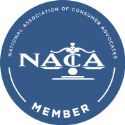Federal Student Loan Default
Student Debt Lawyers in New York
What does is mean to default on a Federal Student Loan?
Being in "default" means that you have not followed through with the terms agreed upon in your promissory note, which dictates a schedule for your payments. The promissory note is the legal document you sign when taking out a loan. If you do not make payments on their due dates, then you are in default.
If you make monthly repayments, you loan is only considered to be in default if you have missed payments for 270 days.
If you make repayments fewer than once a month, your loan is in default after 330 days of missing payments (these circumstances are associated only with FFEL Programs loans).
How Is Missing A Payment A Problem?
After you have missed your first payment, your loan is delinquent and will continue as such until all of your payments have been made. The delinquencies will be reported, resulting in a negative credit score. A negative credit score will prevent you from borrowing money and will also increase your interest rates.
You might also find it difficult to:
- Register for utilities
- Obtaining home owner’s insurance
- Signing up for a cell phone plan
- Get approved for apartment rentals
Overall, it is essential that you are fully up-to-date with your payments. Upon arrival of your bill, you must be prepared to start making payments.
WHAT ARE THE CONSEQUENCES OF DEFAULT?
The consequences are numerous and are as follows:
-
You will be required to pay the total unpaid sum of your loan and any interest.
- You will no longer be eligible to obtain plans (e.g. deferment, repayment).
- You will not be able to receive any additional financial aid for school.
- Your loan account is delegated to a collection agency.
- Your loan will be delinquent, and as a result, your credit score will decrease.
- Your tax returns (federal and state) may be withheld by the Internal Revenue Service. The IRS will then use these tax returns to pay off portions of your student loan debt.
- Eventually, your loan debt will accumulate due to penalties such as late fees, collection fees, attorney’s fees, and other related expenses.
- The federal government may require your employer to engage in a wage garnishment.
- Legal action may be taken against you, and you may lose the purchasing and selling privileges of your assets.
- If you work for the federal government, 15% of your disposable income may be used to repay your loan via Federal Salary Offset.
- It will take a very long time to restore and improve your credit.
WHAT SHOULD I DO IF MY STUDENT LOAN IS IN DEFAULT STATUS?
Don’t know where to turn? Our attorneys in New York can help you understand your options for resolving outstading federal student loans, which may include loan rehabilitation, consolidation, settlement, loan discharge, or forgiveness.
Once the loans are removed from default status, a borrower would want to enroll onto a payment plan such as income-based repayment in order to affordably repay the remaining balance. Our lawyers can help you identify which payment plans may be available to you.
Contact our lawyers at the number provided below. We can help you build a plan to resolve your defaulted student loans.
What If My Loans Are In Default, But I Think It’s An Error?
You may be able to fix this problem if at least one of these scenarios is true:
- You are a part-time student.
- You have been approved for deferment.
- There is a possibility that the payments you’ve made were not documented properly in your account.
If any of these scenarios apply to you, call your servicer to advise them of the issue. If you need further assistance, contact our student loan law firm at (888) 301-0584.











